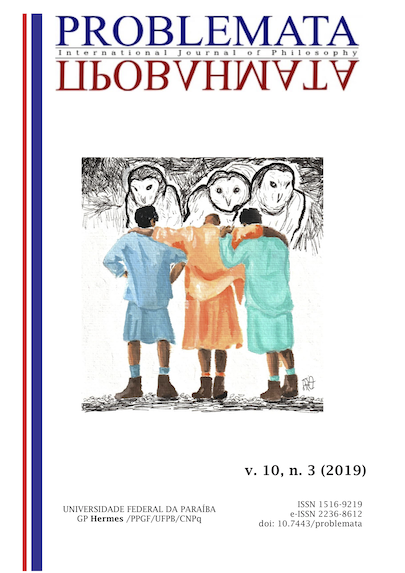TRUST, CONSENSUS, DEMOCRACY
DOI:
https://doi.org/10.7443/problemata.v10i3.49215Keywords:
Trust, Consensus, DemocracyAbstract
This article discusses, in an essayistic way, the general relationship trust/consensus/ democracy. To develop this thematic, we assume that, in an ontological sense, trust is the genetic foundation of democracy. Given this, we have chosen the following guiding questions for research: What is democracy? How does the constitution of possible democracy occur in the concrete world of life of men living under the rules of Capital? To the first question, we answer that: democracy is the power of government exercised directly by the people; this is the “true democracy”. To the other question, we answer that: in an ontological sense, trust is the genetically founding metaphysical element of the consensus necessary for the formation of democratic practices. Converting trust into consensus is the task of political activity. Political action transforms the trust shared by the majority of individuals, and which therefore configures itself as a general will, in consensus. The product of this consensus is materialized in the form of ideas / strategies / values / practices / projects etc., which will govern the lives of individuals in society. However, in the material-dialectical world of life of men, the capitalist world, democracy happens when sociopolitical life is shaped by consensus, which has been built and is driven by the logic and power of capital. For this reason, consensus mirrors (represents) the interests of those who are few but possess economic power; and those who effectively govern do not fulfill the interests of the people. This is pseudo democracy: representative democracy. Considering these ideas, it is correct to conclude that democracy will only be better understood when it is assumed as a dialectical process originated from the trust that has been converted into consensus. The challenge for the sciences is to open to accept the validity of metaphysical knowledge for understand democracy.
Downloads
References
MARX, Karl. As lutas de classes em França de 1848 a 1850. In: MARX, Karl; ENGELS, Friedrich. Obras escolhidas: em três tomos. Tradução: Álvaro Pina e Fernando Silvestre. Lisboa: Edições Avante: Moscou: Edições Progresso, v. 1.
MARX, Karl. Crítica da Filosofia do Direito de Hegel. Tradução Rubens Enderle e Leonardo de Deus. 2 ed. rev. São Paulo: Boitempo, 2010.
MARX, Karl. Lutas de classes na Alemanha. Tradução Nélio Schneider. São Paulo: Boitempo, 2010.
MARX, Karl. O 18 de Brumário de Louis Bonaparte. Tradução Nélio Schneider. São Paulo: Boitempo, 2011.
MARX, Karl. Crítica ao Programa de Gotha. Tradução Nélio Schneider. São Paulo: Boitempo, 2012.
PLATÃO. A República. Tradução Maria Helena da Rocha Pereira. 9. ed. Lisboa: Fundação Calouste Gulbenkian, 2001.
ROUSSEAU, Jean-Jacques. Do contrato social. Tradução Lourdes Santos Machado. 2 ed. São Paulo: Abril Cultural, 1978. (Os Pensadores).
Downloads
Published
Issue
Section
License
Authors who publish with this journal agree to the following terms:
- Authors retain copyright and grant the journal right of first publication with the work simultaneously licensed under a Creative Commons Attribution License that allows others to share the work with an acknowledgement of the work's authorship and initial publication in this journal.
- Authors are able to enter into separate, additional contractual arrangements for the non-exclusive distribution of the journal's published version of the work (e.g., post it to an institutional repository or publish it in a book), with an acknowledgement of its initial publication in this journal.
-
- Authors are permitted and encouraged to post their work online (e.g., in institutional repositories or on their website) prior to and during the submission process, as it can lead to productive exchanges, as well as earlier and greater citation of published work (See The Effect of Open Access).





